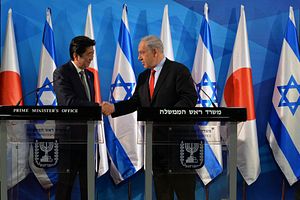Japanese Prime Minister Shinzo Abe’s three-day visit to Israel was cut short and ended on January 20, due to an ongoing hostage crisis. The terror group Islamic State (IS) is threatening to kill two Japanese nationals within 72 hours should their demand of a $200 million ransom not be met. The deadline expires this Friday.
As Shinzo Abe admits, “This is a very tough race against time, but the government will do its utmost… I have ordered the government to use all diplomatic channels and routes possible… to ensure the release of the two people.” Yet, he also added, ““Japan will never yield to terrorism. Japan will do its best in the battle against the cowardice of terrorism, hand in hand with the international community.”
While in the Middle East, the Japanese prime minister had pledged $ 200 in non-military aid for regional countries affected by the rise of the terror group IS, stating that, “Japan is determined to contribute even more proactively to world peace and stability.” Shinzo Abe is vehemently trying to push Japan towards a more pro-active role on the international stage. During his time in Israel, Abe and Israeli Prime Minister Netanyahu renewed their commitment to expand Israel-Japanese cooperation on a number of issues, including in the field of counter-terrorism.
As I reported before, Japan and Israel are especially keen to further develop ties in cyberspace. During an Israeli-Japan Economic Forum on January 18, Netanyahu emphasized Israel’s unique prominence in the cybersecurity business sector: “”Despite the fact that we’re only a country of a few million people, we receive almost 10 percent, almost 10 percent of the investment in cyber security start-ups,” he said. “This is a vast multiple over our relative proportion in the world’s population.”
Israel and Japan held their first dialogue on cyber issues back in November 2014. According to the Japanese Ministry of Foreign Affairs, topics encompassed rules and norms in cyberspace, national cybersecurity strategies (including the re-structuring of the public sector in order to be better be able to combat cyber threats), and various economic issues.
According to Netanyahu, Tel Aviv’s move toward Japan is partially inspired by Israel’s political standing in parts of Europe: “I emphasize eastern markets not because we want to give up on other markets, but we certainly want to decrease our dependence on certain markets in Western Europe. Certain markets in Western Europe are undergoing a wave of Islamization, anti-Semitism and anti-Zionism. These waves are washing over it and we would like to ensure that the State of Israel will have varied markets around the world.”
However, for Japan, the current hostage crisis illustrates one of the downsides of Abe’s aggressive push to make Japan more relevant geopolitically by forging closer ties with non-traditional allies like Israel. Also, Abe’s foreign policy agenda appears to be not as popular at home, despite his recent election victory.

































